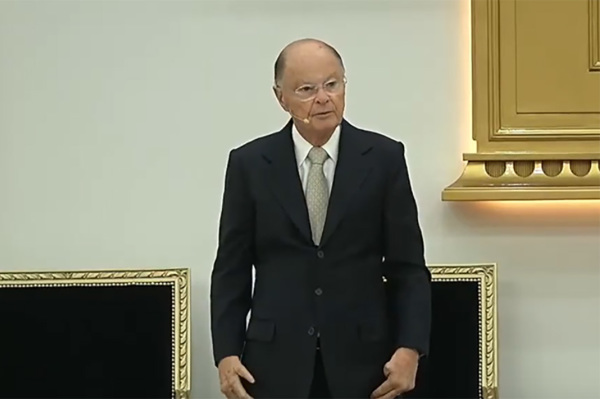Scholars Find Decline of Christianity in the West
Recently, many scholars around the world are noticing how the trend of Christianity is losing its light in the West but rising as the new light in Asia, Africa, and Latin America.
According to Ed Vitagliano, news editor for AFA Journal, a monthly publication of the American Family Association, noted how Christianity is waning in the West because of the “advancing assault of secularism and New Age spirituality.” However at the same time he explained of a developing phenomenon that Christianity is growing in the other parts of the world so called “Global South” – Africa, Latin America and Asia and in the next 50 years he assumed those regions will become the new “spiritual home of faith.”
Calling it a pessimistic view, Philip Jenkins, professor of history and religious studies at Pennsylvania State University, discussed in his book, ‘The Next Christendom: The Coming of Global Christianity,' that for over a century, the decline of religion has become a common Western thought.
Whether or not it is hard to believe, there is a new hope rising: Christianity is still spreading in the other parts of the world.
Jenkins continued saying that we are living through “one of the transforming moments in the history of religion worldwide” as Christianity is rising in the South.
Mark Hutchinson, chairman of the church history department at Southern Cross College in Australia, also noted that "what many pundits thought was the death of the church in the 1960s through secularization was really its relocation and rebirth into the rest of the world."
Vitagliano wrote in his commentary that in Africa in the year 1900, for example, there were approximately 10 million Christians on the continent and by 2000, the number had grown to 360 million. He also included the declining number of members of the Episcopal Church in the U.S. whereas in Uganda alone there are more than 8 million Anglicans. In terms of evangelical Christians, who are recognized as most thriving group within the Christian community, he noted that 70% of them live outside of the West.
According to researcher David Barrett, author of World Christian Encyclopedia, Africa is gaining 8.4 million new Christians a year and according to Jenkins, South Korea grew in number of believers from 300,000 in 1920 to 10 to 12 millions now, which is about 25% of the population.
Author and journalist Philip Yancey, said he has noticed how God doesn’t stay at one place but moves geographically where He is wanted. He said, "As I travel I have observed a pattern, a strange historical phenomenon of God 'moving' geographically from the Middle East, to Europe to North America to the developing world. My theory is this: God goes where He's wanted."
Rev. David Cornick, the general secretary of the United Reformed Church in Britain, said, "In Western Europe, we are hanging on by our fingernails. The fact is that Europe is no longer Christian."
Most scholars and Christian leaders, including the pope, who complained on the proposed constitution of the European Union, which excluded any reference to God or its Christian past, blame on prevalence of secularism for the cause of diminishing Christianity.
One other factor to the cause of diminishing Christianity in Europe would be the decreasing percentage of church attendance. Vitagliano noted that according to a major survey in the 1990s, the percentage of people attending church on an average Sunday in some European countries is a mere fraction of the total population: England (27%), West Germany (14%), Denmark (5%), Norway (5%), Sweden, (4%) and Finland (4%).
However according to Gene Edward Veith, culture critic for World magazine, attendance of more conservative Catholic Church is far higher than that of liberal Protestant churches: Ireland (84%), Poland (55%), Portugal (47%), and Italy (45%).
"These are Catholic countries where the church has remained conservative," Veith says. "Catholic churches that have gone liberal -- in the United States, France, the Netherlands -- have the same low attendance rates as liberal Protestants."
Veith added that the problem is found in many of the churches themselves: "This decline is directly attributable to the theological liberalism of the once-powerful state churches."
Veith also explained the reason why Christianity is spreading so rapidly in the Global South is not due to its modernistic and liberal thoughts but because the gospel is proclaimed: "It is not modernist, liberal Christianity that is sweeping through the Southern Hemisphere," says Veith, "but a Christianity in which the gospel is proclaimed, that believes God's Word, that refuses to conform to the world."
Vitagliano explained the new trend of Christianity rising in the Global South as encouraging news for the believers in the U.S. but he also expected of the difficulties that Christians would face because of the unreached people live in an area known as “the 10/40 Window” which Elisabeth Farrell, co-author of ‘China: The Hidden Miracle” describes as “an imaginary rectangle between the 10th and 40th parallels north, stretching from Africa to Japan” where there are unspeakable persecutions against Christians.
According to the U.S. State Department Annual Report on Religious Freedom 2000, Muslim persecution has included "indiscriminate bombings, the burning and looting of villages, and the killings, abductions, rapes, and arbitrary arrests and detentions of civilians."
According to Jenkins, the area was historically Muslim lands into which Christian missions yet have penetrated. It is known that major non-Christian religions such as Islam, Buddhism, Hinduism, Sikhism, Shintoism and Taoism were born in that region.
Many scholars consider Islam as Christianity’s major religious competitor. They still believe the conflict between Christianity and Islam will continue for another fifty years.
No matter how difficult it is to reach the unreachable, Vitagliano believes the 10/40 Window is where the Gospel has to go and he thinks missionaries from the Global South will carry out that commission.
“Can the churches of the West produce the necessary missionaries to accomplish this task?” he wrote, “After all, Christians in Europe, North America and Oceania already have their hands full with spiritual problems at home: they are stinging from cultural setbacks over the last 50 years on issues ranging from abortion to homosexuality, and fighting to keep secularism from capturing even larger swaths of the populace.It might be an odd concept, but missionaries to the 10/40 Window may very well come -- in fact, may have to come -- from the Global South.”
Veith also expected of nonwhite missionaries reaching out to the West. He said, "What we need now are missionaries from Africa to convert the heathen in Europe and America."






















